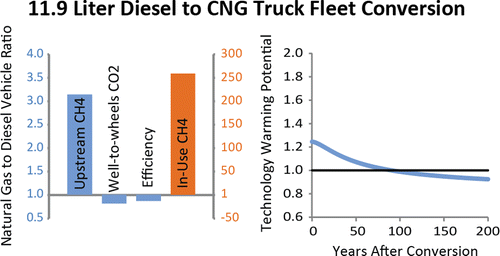Natural gas versus diesel: Examining the climate impacts of natural gas trucks

Some major trucking companies are turning to natural gas to fuel their fleets—and to earn "green" credit among customers. But celebrating lower emissions could be premature, according to an analysis in the ACS journal Environmental Science & Technology. Researchers have found that converting heavy-duty trucks to run on natural gas could lead to negative climate impacts if steps are not taken to improve engine efficiency and reduce methane emissions from the fuel's supply chain.
Burning natural gas emits less carbon dioxide (CO2) into the atmosphere than other fossil fuels, but the process of getting natural gas out of the ground and delivering it through pipelines releases methane, a much more potent greenhouse gas than CO2. So, Jonathan Camuzeaux and colleagues wanted to investigate the climate impacts of switching to natural gas in different types of heavy-duty trucks.
The researchers examined a range of assumptions for methane leakage and several different kinds of commercial, natural-gas truck engines. They calculated that switching heavy-duty truck fleets from diesel to natural gas could lead to worse climate impacts over the next 50 to 90 years than remaining with diesel due to methane's high potency as a greenhouse gas in the near term. But, they added, reducing methane losses from the supply chain and improving natural gas engine efficiency could make switching fuels climate-friendly.
More information: Influence of Methane Emissions and Vehicle Efficiency on the Climate Implications of Heavy-Duty Natural Gas Trucks, Environ. Sci. Technol., Article ASAP. DOI: 10.1021/acs.est.5b00412
Abstract
While natural gas produces lower carbon dioxide emissions than diesel during combustion, if enough methane is emitted across the fuel cycle, then switching a heavy-duty truck fleet from diesel to natural gas can produce net climate damages (more radiative forcing) for decades. Using the Technology Warming Potential methodology, we assess the climate implications of a diesel to natural gas switch in heavy-duty trucks. We consider spark ignition (SI) and high-pressure direct injection (HPDI) natural gas engines and compressed and liquefied natural gas. Given uncertainty surrounding several key assumptions and the potential for technology to evolve, results are evaluated for a range of inputs for well-to-pump natural gas loss rates, vehicle efficiency, and pump-to-wheels (in-use) methane emissions. Using reference case assumptions reflecting currently available data, we find that converting heavy-duty truck fleets leads to damages to the climate for several decades: around 70–90 years for the SI cases, and 50 years for the more efficient HPDI. Our range of results indicates that these fuel switches have the potential to produce climate benefits on all time frames, but combinations of significant well-to-wheels methane emissions reductions and natural gas vehicle efficiency improvements would be required.
Journal information: Environmental Science & Technology
Provided by American Chemical Society

















